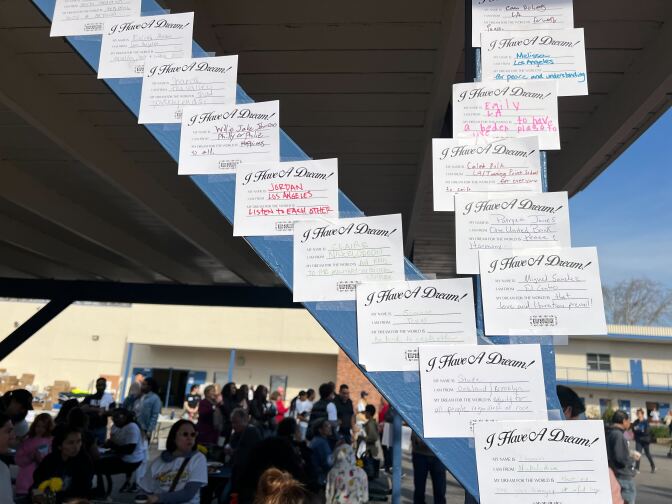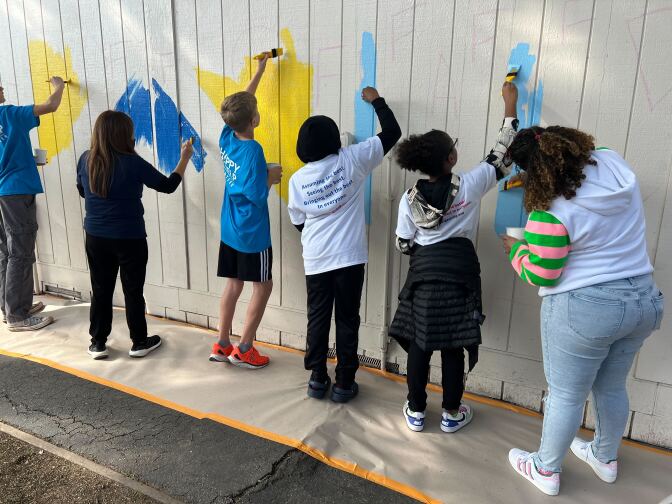This story is free to read because readers choose to support LAist. If you find value in independent local reporting, make a donation to power our newsroom today.
Thousands Of Volunteers Honor MLK’s Legacy With Acts Of Service

Shelley Claborn drove from Los Alamitos to the Los Angeles Memorial Coliseum on Monday morning with her 11-year-old son and 3-year-old daughter. Her son, she said, wanted to honor Dr. Martin Luther King’s legacy and spend the day volunteering.
“I go by it's a day on, not a day off, and so we always try to do something,” she said. “I'm helping them understand the importance of what Dr. Martin Luther King stood for in helping others. So, usually we're at the California African American Museum or we're volunteering.”

Claborn was not the only one. In 1994, Congress designated Dr. Martin Luther King Day as a national day of service. And in that spirit, thousands of volunteers descended on the Coliseum to pack hygiene kits, make no-sew blankets, create mosaic murals, build ready-to-eat meal kits and hear from nonprofits on the work they do and how to get involved at an event organized by L.A. Works, a local volunteering organization.
The Coliseum venue was especially significant given that Dr. King spoke there 60 years ago to a multifaith audience urging the passage of the Civil Rights Act.

“This bill does not pass with strength, the already ugly sort of racial injustice on the body politics may suddenly turn malignant,” Dr. King said in the 1964 address. “And our nation may well be inflicted with an incurable cancer that will destroy our political and moral health. And so for the health of this nation, it is necessary to pass this bill.”
The Civil Rights Act passed a few weeks later ending discrimination based on sex, gender, race, religion, color and national origin.
Bailor Jalloh, a 22-year-old student from Sierra Leone who was volunteering at the Coliseum on Monday, said he wished he was old enough to hear the speech.
“He's one of the greatest civil rights leaders ever, and I've read about him, I've studied some of his works,” he said. “I've listened to him talk. I try to shape my life according to the way he lived it.”

For Jalloh, there was “no better way” to spend his time than honoring Dr. King.
As he stuck pieces of ceramic on a mural, he said that Dr. King’s message, especially his quote "Injustice anywhere is a threat to justice everywhere,” is relevant today given that there are conflicts happening worldwide.
“He was always for peace, trying to get people to see the human side of us where we can communicate, see our differences and come to a conclusion,” Jalloh said.

The Coliseum event was one of many commemorations throughout Southern California of both Dr. King’s birthday — Jan. 15, 1929 — and the National Day of Service. The annual Kingdom Day parade, the nation’s oldest, kicked off from West Martin Luther King Jr. Boulevard at 10 a.m. and headed down Crenshaw Boulevard to ceremonies in Leimert Park.

In a statement, Mayor Karen Bass, who was among the parade participants, said, "Today, we honor the life and legacy of Dr. Martin Luther King Jr., who brought transformative change to the country and the world on behalf of our most vulnerable communities. Now, as we confront the homelessness crisis on our streets, we must continue Dr. King’s mission. The inequality is staggering, with more than 70% of unhoused Angelenos being people of color. While we celebrate the legacy of Dr. King today, we must recommit to confronting this crisis of our time. Bringing unhoused Angelenos inside is a matter of life or death.”

Nearby in Leimert Park, hundreds of volunteers gathered at 42nd Street Elementary School to pack winter clothing kits complete with scarves, beanies and socks. Among them was McKenzie Neely-Wright, an Inglewood resident.
“Martin Luther King's message is more important now than it has been ever. We're in a time where we're more divided than ever in this country. And we've lost this understanding of equality and everyone coming together,” she said. “And so, being able to serve and do something like this, that is a benefit to people who don't just look like me, but that also are just minorities and or people that are in need is important.”








